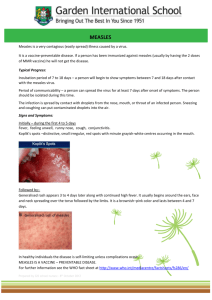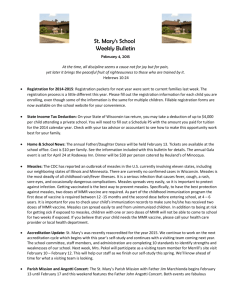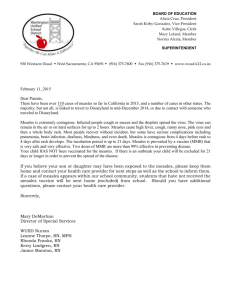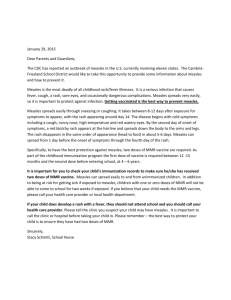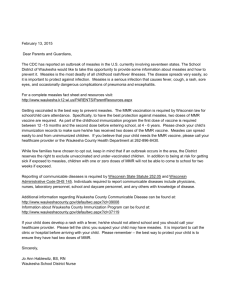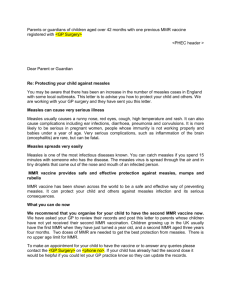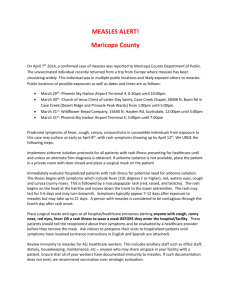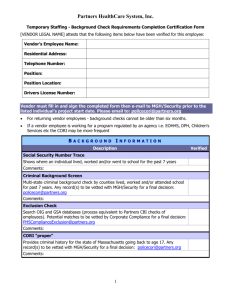Measles
advertisement
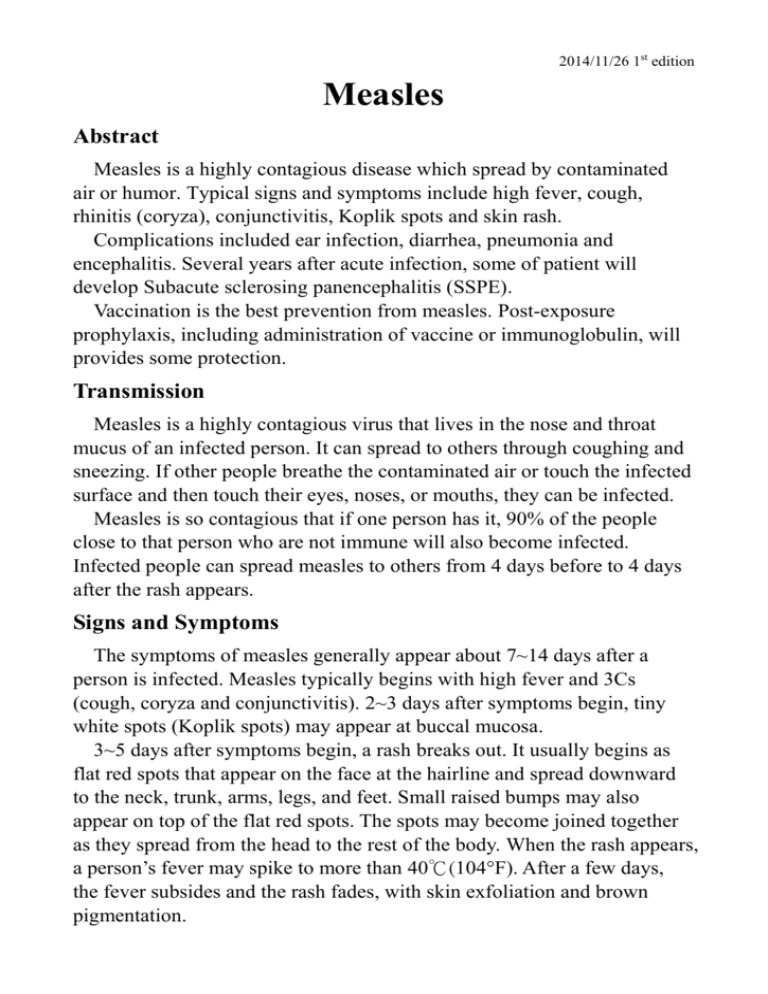
2014/11/26 1st edition Measles Abstract Measles is a highly contagious disease which spread by contaminated air or humor. Typical signs and symptoms include high fever, cough, rhinitis (coryza), conjunctivitis, Koplik spots and skin rash. Complications included ear infection, diarrhea, pneumonia and encephalitis. Several years after acute infection, some of patient will develop Subacute sclerosing panencephalitis (SSPE). Vaccination is the best prevention from measles. Post-exposure prophylaxis, including administration of vaccine or immunoglobulin, will provides some protection. Transmission Measles is a highly contagious virus that lives in the nose and throat mucus of an infected person. It can spread to others through coughing and sneezing. If other people breathe the contaminated air or touch the infected surface and then touch their eyes, noses, or mouths, they can be infected. Measles is so contagious that if one person has it, 90% of the people close to that person who are not immune will also become infected. Infected people can spread measles to others from 4 days before to 4 days after the rash appears. Signs and Symptoms The symptoms of measles generally appear about 7~14 days after a person is infected. Measles typically begins with high fever and 3Cs (cough, coryza and conjunctivitis). 2~3 days after symptoms begin, tiny white spots (Koplik spots) may appear at buccal mucosa. 3~5 days after symptoms begin, a rash breaks out. It usually begins as flat red spots that appear on the face at the hairline and spread downward to the neck, trunk, arms, legs, and feet. Small raised bumps may also appear on top of the flat red spots. The spots may become joined together as they spread from the head to the rest of the body. When the rash appears, a person’s fever may spike to more than 40℃(104°F). After a few days, the fever subsides and the rash fades, with skin exfoliation and brown pigmentation. Complications People younger than 5 years old, older than 20 years old, with pregnancy and under immunocompromised situation are more likely to suffer from measles complications. Common measles complications include ear infections (may cause permanent hearing loss) and diarrhea. Severe Complications include pneumonia and encephalitis. They may need to be hospitalized and could die. SSPE is a rare but fatal degenerative disease of the central nervous system, which characterized by behavioral and intellectual deterioration and seizures. It generally develops 7 to 10 years after measles infection. Measles may cause pregnant woman to give birth prematurely or have a low-birth-weight baby. Post-exposure prophylaxis and vaccination People exposed to measles and cannot readily show the evidence of immunity against measles should be offered post-exposure prophylaxis or be excluded from the setting (school, hospital, childcare). MMR vaccine, if administered within 72 hours of initial measles exposure, or immunoglobulin, if administered within 6 days of exposure, may provide some protection or modify the clinical course of disease Measles can be prevented with measles-containing vaccine, which is primarily administered as the combination measles-mumps-rubella (MMR) vaccine. The combination MMR vaccine can be used for children aged 12 months through 12 years for protection against measles, mumps, rubella and varicella. Single-antigen measles vaccine is not available. One dose of MMR vaccine is approximately 93% effective at preventing measles; two doses are approximately 97% effective. Almost everyone who does not respond to the measles component of the first dose of MMR vaccine at age 12 months or older will respond to the second dose. Therefore, the second dose of MMR is administered to address primary vaccine failure. Traveler vaccination recommendation (1) Infants: 6~11 months of age should receive one dose of MMR vaccine. (Taiwan: infants younger than 12 months are not suggested to travel internationally) (2) Children: 12 months of age or older should have documentation of two doses of MMR vaccine. (3) Teenagers and adults born during or after 1957 without evidence of immunity against measles should have documentation of two doses of MMR vaccine, with the second dose administered no earlier than 28 days after the first dose. Edited by NDU medical office Resource: American CDC http://www.cdc.gov/
